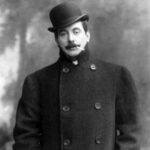Puccini and His World
The 27th Season Bard Music Festival
August 5–14, 2016
August 5–14, 2016


August 5–7
Puccini and Italian Musical Culture
August 11–14
Beyond Verismo
How can the work of a composer who wrote three of the most enduringly popular operas of all time—La bohème, Madama Butterfly, and Tosca—and three more that are produced regularly—Manon Lescaut, La fanciulla del West, and Turandot—be remotely controversial? But Giacomo Puccini (1858–1924) was and remains an object of controversy. In his lifetime, the popularity of his operas defied the predictions of many critics. Butterfly was a fiasco at its premiere and La Bohème was met with only faint praise. Critics derided Puccini for not being Italian enough. He was accused of courting vulgarity and exploiting cheap sentimentality. He was seen as facile and to have failed, with the possible exception of La fanciulla, to match the profundity and subtlety of Verdi, the grandeur of Wagner, and the dramatic virtuosity of Richard Strauss.
At the heart of this so-called Puccini problem rests the shifting place of musical culture in the 20th century. Puccini rose to fame as opera struggled to maintain its preeminence as a cultural and political instrument in the face of the advent of recorded sound, the popularity of photography, motorboats, automobiles (three of Puccini’s obsessions), and, most of all, film. Though Puccini succeeded where others failed, his success was ascribed to various theories of the decline of culture and standards of taste. Furthermore, Puccini’s popularity was worldwide at a time of rapid political change that witnessed the emergence of new nationalisms, World War I, the twilight of European imperialism, and the rise of communism and fascism. What kind of music and art were called for in an era of economic and social transformation?
The Bard Music Festival–using Puccini's complex and tortured biography, Italian politics in the years between Garibaldi and Mussolini, Italian arts and letters between Manzoni and D'Annunzio, and Italian music from Verdi to Dallapiccola–will explore Puccini's work and the music of his Italian contemporaries. Concerts and panels will reveal his unique genius as well as the legitimate and troubling issues that have kept debates about Puccini alive.
All programs and performers are subject to change.